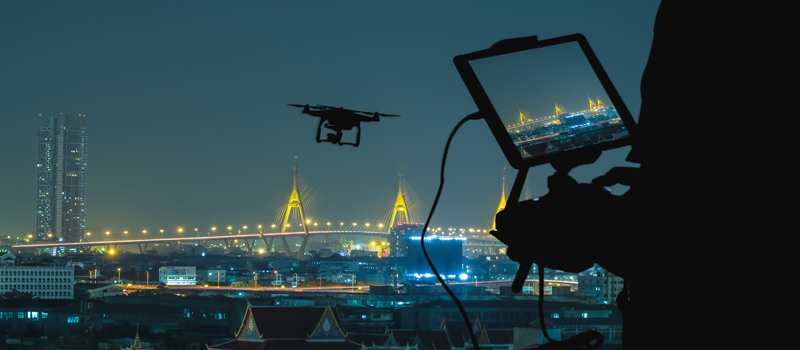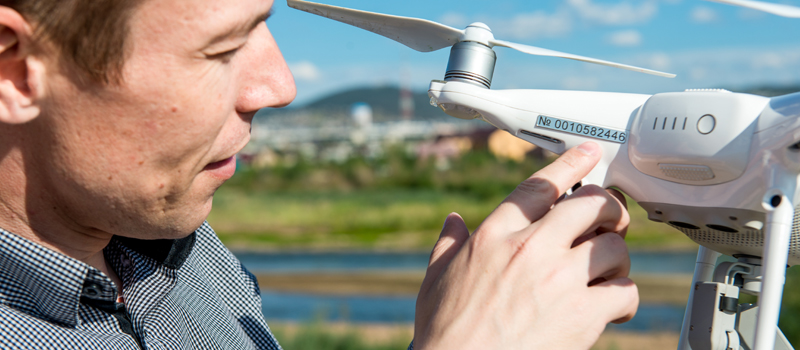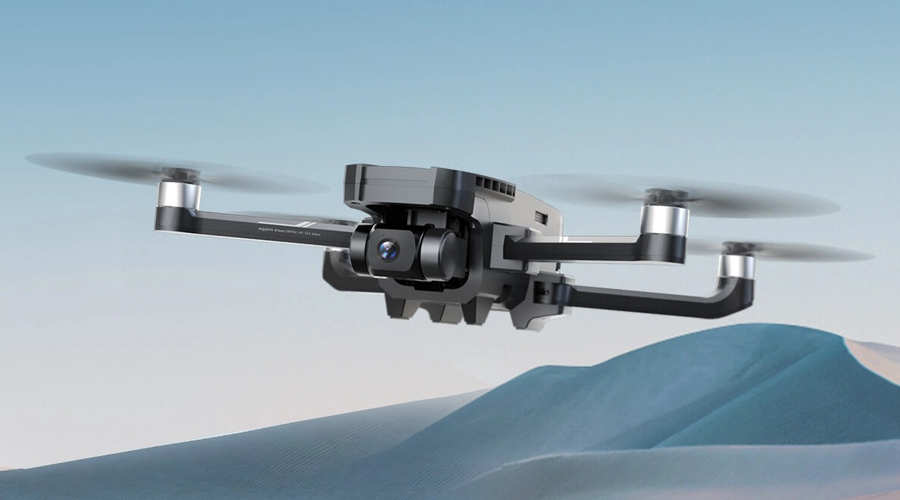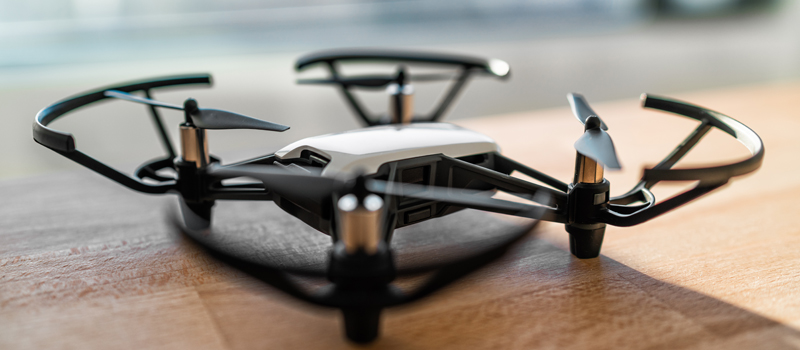-
Overview of the current rules on night operations
-
What will be the new conditions for flying at night?
- For first-time Part 107 license applicants
- For current holders of Part 107 drone licenses
-
When will compliance with the updated rules start?
-
What if I have a Part 107.29 waiver?
-
Is a Remote ID needed for drone operations at night?
-
Updates to Pilot Institute training materials
-
Final thoughts
So far, we have already tackled the basics of the final ruling on Remote ID, what the new rules on flying over people and moving vehicles are, and how FRIAs work. In this article, we will be covering yet another facet of drone flight that will be affected by the new Remote ID rules – flying at night.
For years, the restrictions on flying beyond daylight have been controversial and have hindered the operations of commercial drone pilots. As part of the new ruling on Remote ID, amendments were also made to some of the provisions of Part 107. Take note that these amendments are for the Part 107 rules and those who fly recreationally will be unaffected.
Overview of the current rules on night operations
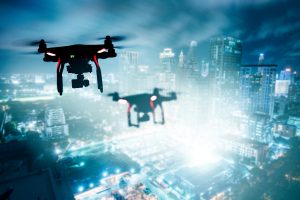
Before the amendments, the Part 107 rules stated that commercial drone operations “can fly during daylight or in twilight (30 minutes before the official sunrise of 30 minutes after official sunset) with appropriate anti-collision lighting”.
Recognizing that some commercial drone jobs have to be done at night, the FAA included the provision for night operations in the list of restrictions that the agency can waive upon request. The industry has responded to the tune of more than 4400 waivers issued by the FAA from 2016 to 2020. This is more than 90% of all the waivers that the FAA has issued for Part 107.
With these numbers, it was very apparent that operations at night had become a critical part of commercial drone services. In January 2019, the FAA submitted a notice for proposed rulemaking (NPRM) for revisions to the rules on night operations. This NPRM eventually evolved into the final amendments which will go into implementation in a few weeks’ time.
What will be the new conditions for flying at night?
Under the amended Part 107 rules, licensed drone pilots will be allowed to fly at night without an approved waiver. This will be subject to a few conditions depending on whether you will be applying for a Part 107 drone license for the first time or if you’re already holding one.
For first-time Part 107 license applicants
If you are yet to apply for the Part 107 drone license, then there isn’t really anything new in the whole testing and application process. The only major change is that the knowledge test will be updated to include topics related to night operations. As this was not covered in any previous versions of the Part 107 knowledge test, you will have to refer to updated training materials as well. Pilot Institute will provide these updated materials in our Part 107 Made Easy online course.
For current holders of Part 107 drone licenses
Current Part 107 drone license holders can breathe a sigh of relief as you don’t need to take the updated challenge test. Instead, you will just have to finish a recurrent online training that will be available at www.faasafety.gov. The online training is free. The FAA also offers several other training modules on the same website, so signing up for an account is a good idea regardless of if you’re planning to fly your drone a night or not.
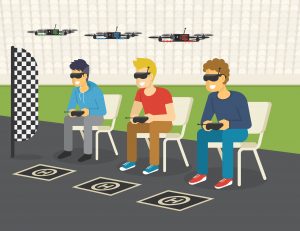
The changes in the knowledge test, as well as the online training module, will focus on topics related to operations at night. We expect topics like night physiology and night illusions to be covered by both the new knowledge test and the training module. With the new topics, concerns such as limited depth perception at night and the lighting requirements should be addressed.
Even without a need for a waiver, drones operated at night must still be equipped with a set of appropriate anti-collision lights. The stock lights that come with drones typically do not comply with night operation requirements. Getting a set of add-on strobe lights with good visibility should be a more guaranteed measure.
When will compliance with the updated rules start?
The module for night training will be published on the FAA Safety 45 days after the publication of the final ruling. This will be in March 2021. It is NOT live right now. Do not get the recurrent training for Part 61 certificate holders confused with the recurrent training for Part 107 license holders.
At around the same, we also expect the Part 107 initial certification test to be revised with material related to night operations.
Part 107 pilots can only start operations at night 15 days after the online training course has been published. This is to avoid people from rushing to finish the training, which can clog the FAA’s network. With the 15-day buffer period, there’s no need for anyone to hurry to do the training on the first day.
What if I have a Part 107.29 waiver?
Those who have valid 107.29 waivers can continue to fly drones at night as normal. However, these waivers will expire 120 days after the publication date of the final ruling.
After the 120-day period (May 15th, 2021), these drone pilots will need to take the online training and comply with the new procedure. They are, of course, free to go through the online course earlier, which will invalidate the need for the Part 107.29 waiver.
Is a Remote ID needed for drone operations at night?
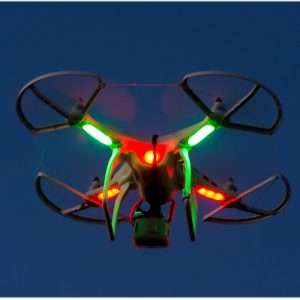
No, the new rules on night operations are completely unrelated to Remote ID requirements. Part 107 drone pilots will be free to fly at night even without a Remote ID, given that they comply with testing or training needs and that their drones are equipped with anti-collision lights.
However, Remote ID will eventually be needed for virtually all drone operations as we have covered in a previous article.
Updates to Pilot Institute training materials
In view of upcoming changes to Part 107 requirements for night operations, our Part 107 Made Easy training course will also be updated with new content. The new material will be made available before the training course becomes available on the FAA website.
If you have signed up to the course at any point in the past, you will be able to access the updated materials as soon as it is available. This is part of the lifetime access benefit that Pilot Institute training courses provide.
Take note that our training course is NOT an officially recognized recurrent training course. In fact, there is no course other than the one offered by the FAA that will satisfy recurrency requirements. This means that you will still need to complete the recurrent training course provided by the FAA on their website to keep your Part 107 drone license current.
Final thoughts
The changes to the current restrictions on drone operations at night have been a long time coming. With the final ruling on Remote ID, the FAA saw fit to roll out amendments to Part 107 that will finally allow drone pilots to fly at night without a waiver.
The additional conditions needed to fly at night also seem to be very reasonable. For those who already hold a Part 107 license, it’s only a matter of completing an online training course. Finally, commercial drone pilots will be able to capture night photos or cover events that happen at night without all the paperwork of applying for a waiver.
